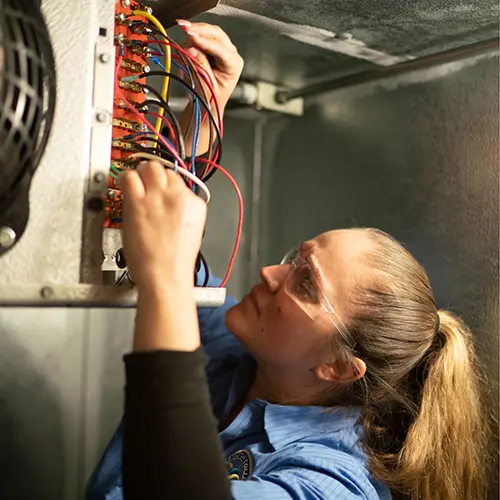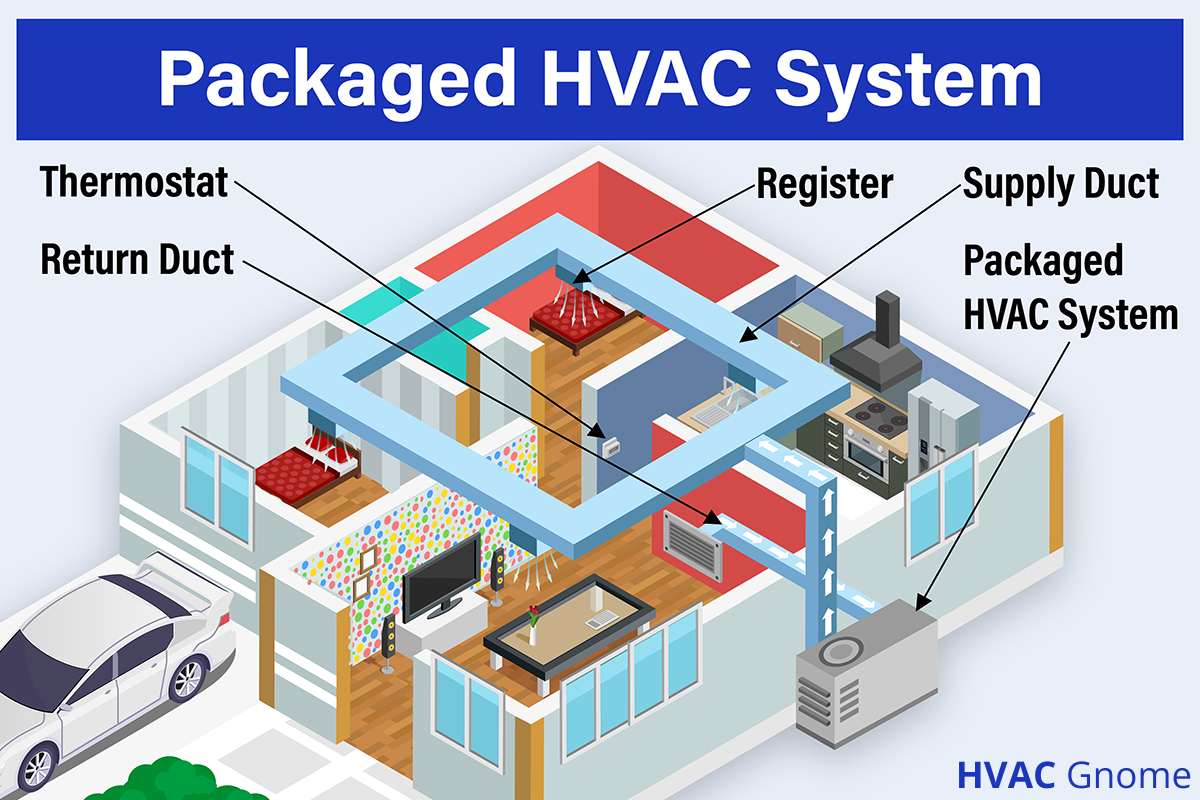An In-Depth Appearance at Heating And Cooling Services and Their Influence On Energy Effectiveness and Expense Cost Savings
With technological developments like wise thermostats and high-efficiency elements, the potential for maximizing system efficiency is large. As we explore the detailed partnership in between A/c systems and operational costs, consisting of the shift in the direction of environmentally pleasant choices, the concern develops: how can these methods be effectively carried out to take full advantage of both environmental and economic advantages?

Importance of Heating And Cooling Solutions
heating and cooling systems are a crucial element of modern buildings, playing an essential role in preserving healthy and balanced and comfortable interior atmospheres. These systems, including ventilation, air, and home heating conditioning, are crucial for controling temperature level, humidity, and air top quality, thereby making sure the health of residents. Reliable heating and cooling systems contribute dramatically to developing an ideal indoor environment, which is vital for both industrial and household areas.
In industrial structures, heating and cooling systems are integral to giving a safe and effective setting. By regulating interior climate problems, these systems help protect against the development of mold and mildew and the spread of airborne pollutants, therefore guarding the health of consumers and employees. Additionally, in domestic settings, heating and cooling systems boost living conditions by supplying consistent thermal convenience and enhancing indoor air high quality, which is vital for overall health and wellness.
Additionally, the style and maintenance of a/c systems have a direct effect on power intake and operational expenses. Correctly designed and kept systems can substantially minimize power use, leading to reduced energy expenses and a smaller carbon footprint. The effectiveness of these systems thus plays a vital function in promoting sustainability and power conservation within buildings, highlighting their significance in the contemporary architectural landscape.
Advancements in Heating And Cooling Modern Technology
Innovation in heating and cooling technology is reinventing the means structures handle indoor climates, introducing a brand-new era of effectiveness and control. Current innovations have concentrated on optimizing energy intake while enhancing user comfort. One notable advancement is the integration of wise thermostats, which make use of man-made knowledge to find out occupancy patterns and change temperatures as necessary, lowering unneeded energy use.
Variable Cooling Agent Circulation (VRF) systems stand for an additional significant jump ahead. These systems enable exact temperature level control in various zones of a structure, boosting comfort and minimizing power waste. VRF modern technology is specifically valuable for huge industrial rooms, offering adaptability and scalability.
In addition, the arrival of Internet of Things (IoT) gadgets has changed a/c systems into interconnected networks with the ability of real-time information collection and evaluation. This connection enables predictive upkeep, guaranteeing systems operate at peak effectiveness and lessening unexpected downtime.
Moreover, innovations in materials and style, such as making use of high-efficiency coils and compressors, have actually improved general system performance - Heating Contractor. The adoption of eco friendly refrigerants also emphasizes the sector's dedication to sustainability
These technological developments are pivotal in decreasing functional prices and ecological influence, setting new criteria for building climate management.
Heating And Cooling Maintenance and Performance
Ensuring optimum efficiency of cooling and heating systems prolongs past technological advancements; it also rests on effective maintenance methods. Routine upkeep is crucial for sustaining efficiency, minimizing power consumption, and extending the life period of a/c systems. The main goal is to ensure that all elements operate at their peak possibility, thereby decreasing energy waste and preserving constant interior convenience degrees.
Routine maintenance tasks, such as cleaning or replacing air filters, checking refrigerant degrees, and evaluating ductwork for leaks, are crucial for preventing unnecessary stress on the system. Dirty or stopped up filters can obstruct air flow, causing the system to work tougher and consume even more power. Also, inadequate cooling agent levels can reduce cooling efficiency, resulting in higher operational costs.
Furthermore, periodic inspections by qualified experts can identify possible problems prior to they intensify into pricey repair services or system failures. These assessments often include inspecting electric connections, adjusting thermostats, and making certain the overall stability of the HVAC system. By resolving small troubles early, companies and house read the full info here owners can prevent unanticipated break downs and enhance power efficiency.
Affordable HVAC Solutions
For those looking to get the most out of their air flow, home heating, and air conditioning systems without damaging the financial institution, discovering economical HVAC solutions can make a substantial distinction. One immediate measure is to purchase programmable thermostats, which enable customers to set particular temperature levels for different times of the day, maximizing power usage and reducing unneeded intake. By automating temperature level changes, property owners can accomplish substantial cost savings on energy bills.
Normal maintenance is an additional coyote hvac crucial component of economical heating and cooling monitoring. Making certain that filters are cleaned or replaced routinely, ductwork is sealed, and units are serviced by experts can avoid expensive repairs and boost system durability. Preventive maintenance not just preserves system performance yet likewise aids in staying clear of unforeseen malfunctions that can bring about pricey emergency fixings.
Additionally, retrofitting existing systems with energy-efficient components, such as variable rate electric motors or high-efficiency compressors, can be a sensible investment. These upgrades enhance functional effectiveness, lower power use, and can frequently be implemented at a portion of the cost of a full system replacement.
Environmental Impact Reduction
Reducing the environmental effect of cooling and heating systems is crucial in today's quest of lasting living. HVAC systems are significant factors to power intake, making up almost 40% of energy use in commercial structures. This power demand commonly depends on fossil gas, leading to greenhouse gas discharges and environmental degradation. Transitioning to a lot more efficient systems, such as those utilizing renewable resource sources, can substantially minimize these impacts.
Technological advancements in heating and cooling style and procedure, consisting of the assimilation of wise thermostats and energy-efficient heatpump, are pivotal in lowering carbon footprints. These advancements enable optimized power usage, reducing wastage and enhancing overall system performance. Furthermore, adopting routine upkeep techniques makes sure heating and cooling systems run at peak efficiency, additional cutting unnecessary power consumption.
Furthermore, the use of eco-friendly cooling agents is essential, as standard refrigerants, like CFCs and HCFCs, have actually been phased out because of their ozone-depleting homes. Modern alternatives, such as hydrofluoroolefins (HFOs), offer decreased environmental dangers, lining up with international ecological procedures. By welcoming these sustainable practices, HVAC services can play a transformative duty in minimizing environmental impacts, promoting power performance, and fostering a much more lasting future.
Conclusion

Furthermore, the style and upkeep of A/c systems have a straight impact on energy consumption and functional costs. Routine maintenance is vital for maintaining effectiveness, minimizing power intake, and prolonging the life period of HVAC systems. HVAC systems are substantial package ac unit factors to power usage, accounting for nearly 40% of energy usage in commercial buildings. Additionally, adopting routine maintenance practices guarantees HVAC systems operate at peak effectiveness, additional reducing unneeded energy intake.
The transition to environmentally pleasant HVAC systems additionally promotes and reduces operational prices sustainability. (Heating Contractor)
Comments on “Heating Contractor Focusing On Efficient Home Heating Solutions”